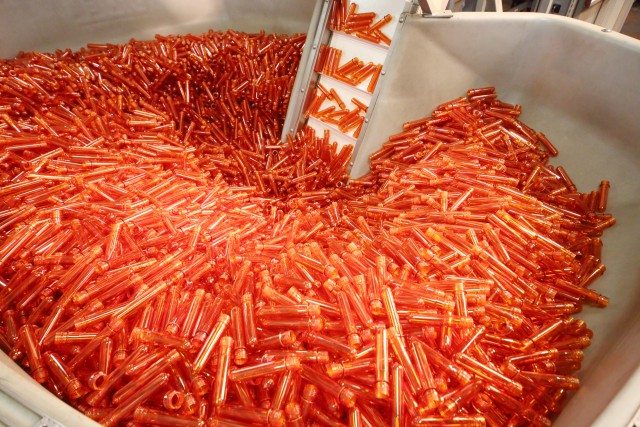Chemistry company Carbios is developing its enzymatic depolimerization process of polyesters rending it applicable to polyethylene terephthalate (PET).
This proprietary process enables the depolymerization of 100% amorphous PET-based commercial products into its original monomers, terephthalic acid (TPA) and ethylene glycol (EG).
Applying this selective depolymerization to PET enables the regeneration of monomers while maintaining the same quality and physicochemical properties as their petroleum-based counterparts.
After separation and purification, the monomers extracted from the enzymatic recycling process developed by Carbios could then be used for the synthesis of virgin PET, therefore avoiding any loss in value of the recycled material.
This milestone, achieved within the Thanaplast project, is the result of a close collaboration between the Toulouse-based teams of the INRA, TWB and the laboratory LISPB from INSA Toulouse.
The market of PET plastics, a fossil-based polyester commonly used in the industry, represented a world production of 21 million tons in 2014, according to SRI Consulting in 2010, ICIS in 2009 and Samsung in 2010.
With an annual growth rate of 4 to 5%, production could reach more than 26 million tons by 2020, says Smithers Pira in 2014, Icis in 2009 and Pira International in 2012.
This thermoplastic material is widely used for manufacturing plastic bottles (69% of PET plastics), films (14%) and packaging (10%) and in other applications.
The properties of PET (flexibility, transparence, thermomechanical strength, lightness, durability) make it a material favored by most plastic bottles manufacturers.
However, conventional technologies implemented to recycle PET waste are very sensitive to contamination by other polymers and impurities.
On a practical level, this involves a sophisticated sorting and high costs for a limited recycling rate.
In addition, current technologies are leading to the production of secondary products of lower quality.
Moreover, complex waste material made out of several polymers including PET cannot be recycled by conventional processes.
In Europe, demand for PET-based virgin plastics was estimated at 3.2 million tons in 2013 (PlasticsEurope in 2014), of which 1.8 million tons are recycled (57%, states Petcore Europe in 2015).
Carbios’ biorecycling process to PET would help treat 100% of PET waste, equal to an addition volume of 1.4 million tons in Europe which are presently left in landfills or incinerated instead of being recycled.
A 2015 CDC Climat Research paper says this could prevent the emission of 4.6 million tons of carbon dioxide equivalent (applied solely to the PET plastics in Europe), thus contributing actively to the European efforts to limit global warming to 2°C above the temperature of the preindustrial period.
To this resource could be added PET fibers, for which the recycling rate is very limited today despite a production estimated at 43 million tons worldwide in 2014, state Tecnon in 2013 and IHS in 2014.










